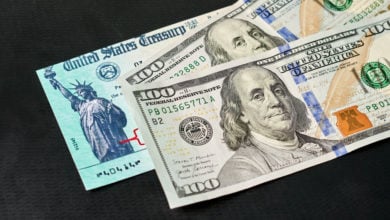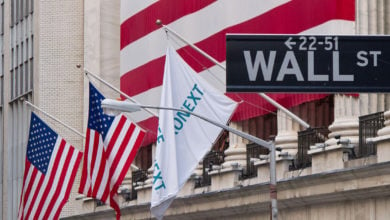Photo credit: Corey Coyle (Wikimedia Commons)
The closing days of January shook Wall Street with a struggle between powerful stock market players and amateur investors that left investment firms reeling with billions in losses.
On one side were hedge funds that had bet big on stock prices dropping for the video game store chain GameStop and other companies. On the other, a large number of small investors coordinating on online platforms such as Reddit’s WallStreetBets forum to buy shares and encouraging others to do the same.
These hedge funds were blindsided as prices quickly shot up in a matter of days fueled by amateur investors flooding the market with small purchases of GameStop shares. As of Jan. 29, investors who had bet against GameStop had racked up $19 billion in losses with the company’s stock price up some 1,800 percent since the beginning of the year.
What happened, and what can working-class people learn from it?
High-stakes gambling in a rigged game
The stock market is a casino for the rich. Investors betting a stock will go up will buy shares hoping to sell them later at a higher price — the classic “buy low, sell high”. But those betting a stock will go down can borrow shares to sell now hoping to buy them back later at a lower price — this “sell high, buy low” strategy is known as a short sell, and it simply reverses the order of operations to create profit opportunities even when stock prices decline.
Short selling is a common practice among hedge funds, and it was the mechanism they used to bet against GameStop. These parasitic speculators could care less whether the stock market thrives or takes a beating — so long as their chips are well-placed and their bets pay off. During the 2008 financial crisis, the Securities and Exchange Commission temporarily halted short-selling in financial companies as hedge funds pounced on failing banks amid economic meltdown.
Of course, the big players in this casino are not ordinary gamblers at the mercy of Lady Luck. They also happen to run the house, and they do their due diligence to stack the odds in their favor. Their vast capital alone can be applied to manipulate stock prices in one direction or another.
But it doesn’t stop there.
In an interview on the show Wall Street Confidential, Jim Cramer, the host of CNBC’s Mad Money and a former hedge fund manager, spoke candidly about how short-selling hedge funds load the dice by feeding rumors and lies to journalists in order to drive stock prices down: “You can’t create yourself an impression that a stock is down, but you do it anyway because the [Securities and Exchange Commission] doesn’t understand it,” Cramer reveals. “This is actually just blatantly illegal.”
“What’s important when you’re in that hedge fund mode is to not do anything remotely truthful,” Cramer continues. “It’s important to create a new truth and develop a fiction … Maybe a few weeks from now the buyers will come to their senses and realize that everything they heard was a lie.”
The investment app Robinhood halted trading in GameStop and AMC last week causing an outcry among their user base of small traders and prompting suspicion that it acted under the pressure of hedge fund managers.
Too big to lose
Wall Street big shots unaccustomed to getting beat at their own game by the “little guy” made no effort to hide their contempt for amateur investors.
The Wall Street Journal, a mouthpiece for the capitalist class elites, described it in a Jan. 30 article “as if a bunch of couch potatoes watching a Los Angeles Lakers basketball game on TV belted down their beer and nachos, barged onto the court—and proceeded to block LeBron James’s shots …” The same article goes on to say there is some truth to the stereotype of these amateur traders as “a 19-year-old living in mom’s basement. Locked down and bored by the pandemic, with fewer sporting events to bet on and stimulus checks (or ‘stimmies’) burning a hole in his pocket …”
Former hedge fund manager Leon Cooperman vented on CNBC: “The reason the market is doing what it’s doing is people are sitting at home getting their checks from the government, okay, and this fair share is a bullshit concept. It’s just a way of attacking wealthy people, and, you know, I think it’s inappropriate and we all gotta work together and pull together.”
It is not hard to understand the delight expressed by so many at seeing these speculators and market manipulators getting a dose of their own medicine. Many on WallStreetBets took pride in sticking it to the billionaires.
But at the end of the day, who comes out on top?
The billionaires will get by just fine. Despite the big headlines, only a tiny fraction of Wall Street power players were exposed to GameStop losses. Melvin Capital, the hedge fund hit the hardest with a 53 percent loss of its entire value in a matter of days, has already been rescued with an injection of billions in capital from other firms. Melvin founder Gabe Plotkin is currently looking to expand his $44-million home in Miami beach.
Unlike WallStreetBets investors who may have risked everything in their GameStop purchase, the wealthy elites hold diverse investment portfolios so that those who were exposed to GameStop losses will hardly face financial ruin. Even if a low-rank billionaire were to lose half of their fortune, that would leave them with an unbelievable sum of money.
The stock market is the capitalists’ party, and party-crashers are not welcome. Within less than a week, hedge funds have already begun organizing a counter-offensive, scanning online forums for intelligence and using bots to disseminate misinformation looking to hinder online traders from orchestrating a repeat of the GameStop saga.
As for those who made some money buying GameStop shares, the vast majority did not strike it rich. Their modest investment meant modest gains, though for working class people that can have a real impact. Fox Business reported one IT worker who was able to pay off nearly $2,500 of their $7,000 credit card debt, and another who was able to erase the remaining $23,500 of their student debt. Stories circulated on social media about some who put their earnings toward medical bills.
Many more who bought into GameStop will actually lose big. The frenzied buying of GameStop shares has now turned into a selloff, with share prices closing at $53.50 on Feb. 4 — down from around $480 on Jan. 28. Those who went all-in with their life savings near the peak price will be wiped out.
They will receive no capital injection. No government bailouts. No golden parachutes.
Hate the players and the game
For the working class, the dangers of the stock market are real. In 2008, workers approaching retirement saw their future crumble as the financial crisis created by the banks and institutional investors wiped out their retirement plans. Wall Street was a major driving force in replacing the guaranteed income of pension plans with privately-managed 401k plans that gamble workers’ retirement savings in the stock market.
Why should workers have to take chances with their future? Why should anyone have to risk their life savings to free themselves of the crushing debt of credit cards, medical bills or student loans?
The stock market is not an arena for class struggle. The prospect of winning big in the stock market is a siren song, a lottery ticket workers cannot afford. This is a rigged game for the wealthy elites whose fortunes can weather the ups and down of the market, or even grow in the face of an economic downturn.
Buying into this game won’t guarantee employment with a decent living for working people. It won’t guarantee free, universal healthcare. It won’t wipe out rent debt to keep those of us facing eviction and foreclosures in our homes. It won’t stop climate change or deter the empire’s war drive.
Solving these crises requires a struggle for power. It requires taking the reins of the economy away from the tiny elite of wealthy profiteers, and putting it in the hands of the working class. It requires reorganizing society around workers’ needs.
To defeat the capitalists, we must defeat capitalism.






